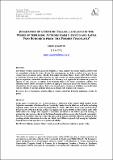Por favor, use este identificador para citar o enlazar a este item:
http://hdl.handle.net/10261/190276COMPARTIR / EXPORTAR:
 SHARE
BASE SHARE
BASE
|
|
| Visualizar otros formatos: MARC | Dublin Core | RDF | ORE | MODS | METS | DIDL | DATACITE | |

| Título: | Judaisation of a hispanic ballad: Landarico in the works of sephardic authors Haim S. Davičo and Laura Papo Bohoreta from the former Yugoslavia |
Autor: | Jovanovic, Zeljko CSIC ORCID | Palabras clave: | Balladry Landarico Haim S. Davičo Laura Papo Bohoreta Judaisation Gender studies Romancero Judaización Estudios de género |
Fecha de publicación: | 2018 | Editor: | Fundación Ramón Menéndez Pidal | Citación: | Abenámar. Cuadernos de la Fundación Ramón Menéndez Pidal. Revista de romancero y filología hispánica 2: 43- 66 (2018) | Resumen: | [EN] In this paper, I examine the case of domestication, i.e. judaisation of the Spanish ballad Landaricoby the Sephardic communities of Serbia and Bosnia. Specifically, I analyse how the ballad was used by the two leading Sephardic authors from the former Yugoslavia, Haim S. Davičo (1854-1918)from Serbia and Laura Papo Bohoreta (1891-1942) from Bosnia, in their own original work. I agrue that the use these authors make of the ballad reflects the changes their respective communities introduced to the ballad's plot and meaning, as portrayed in other versions collected in the Iberian Peninsula and from among other Sephardic communities. Moreover, both authors depict the context (the place and the time) in which this ballad was performed, thus revealing valuable information about the role ballads (and folklore in general) had among the Sephardim. Particular focus is laid upon the issue of gender and balladry [ES] Este trabajo estudia la manera en la que fue adaptado, es decir, judaizado el romance español Landarico entre las comunidades sefardíes de Serbia y Bosnia. Más concretamente, me dedico a analizar el uso que de este romance hacen dos grandes autores sefardíes de la antigua Yugoslavia, Haim S. Davi¿o (1854-1918) de Serbia y Laura Papo Bohoreta (1891-1942) de Bosnia. Las obras de estos dos autores reflejan fielmente los cambios que sus respectivas comunidades introdujeron en la historia y en el significado del romance tal y como se advierte en otras versiones recopiladas en la Península Ibérica y las demás comunidades sefardíes. Por añadidura, ambos autores describen el contexto (el lugar y la ocasión) en el que este romance fue cantado, ofreciéndonos de esta manera valiosos datos sobre el papel que los romances (y el folklore en general) tenían entre los sefardíes. Se prestará particular atención a la relación entre el género y el romancero |
URI: | http://hdl.handle.net/10261/190276 | Identificadores: | issn: 2530-4151 |
| Aparece en las colecciones: | (CCHS-ILLA) Artículos |
Ficheros en este ítem:
| Fichero | Descripción | Tamaño | Formato | |
|---|---|---|---|---|
| Judaisation_of_Hispanic_Ballad.pdf | 462,65 kB | Adobe PDF |  Visualizar/Abrir |
CORE Recommender
Page view(s)
194
checked on 18-may-2024
Download(s)
234
checked on 18-may-2024
Google ScholarTM
Check
Este item está licenciado bajo una Licencia Creative Commons



